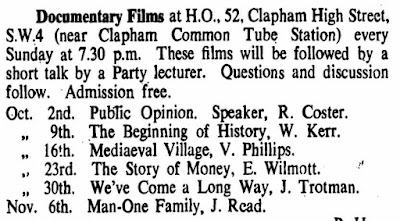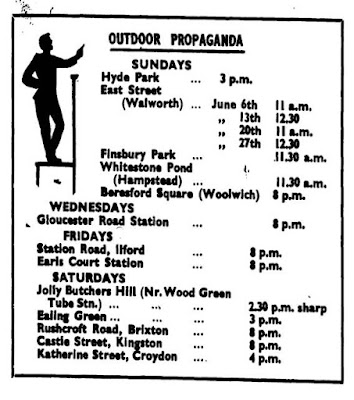Marxism: Past and Present by R. N. Carew Hunt. (Published by Geoffrey Bles)
Nothing more crucially establishes contrast between Marx and Lenin than their views on the nature and function of class-consciousness. Marx saw it as a development of class-awareness of the true position in a system based on antagonistic productive relations. Lenin viewed it as the intellectual prerogative of a political intelligentsia. Marx and Engels never tired of proclaiming that the emancipation of the working class must be the work of the working class itself. Lenin never tired of denying it. Marx and Engels came to hold that long and patient work was necessary to fit the workers for the task of social transformation. Lenin lived in the hectic expectation of “imminent revolution” and “the psychological moment.”
Lenin, like many “intellectuals” and certainly all dictators, had a naively sublime faith in the powers of leadership. It was the Bolsheviks, in fact, who classically taught the “leader principle” which later produced star pupils like Mussolini and Hitler. While Lenin in his more expansive moods spoke of the masses being the historic instrument for the achieving of Socialism, he never relaxed his iron belief that only an élite could provide the intellectual and organizational means for its accomplishment. To the workers he never conceded more than a trade-union consciousness as the upper limit of their mental development. “The mass,” he contended, “have no independent movement of their own.” (Collected Works, Vol. IV. Part III pp. 222 and 235.) He also said: “Left to themselves, the masses become enslaved to bourgeois ideology.”
Marx and Engels saw the working class as the representatives of a new and larger aspect of mankind. Lenin regarded them as political raw material which the Bolsheviks would work up into the finished article. Docile acceptance of Bolshevik plans Lenin taught as the cardinal virtue for the workers. When they demurred, the Kronstadt incident, among others, was a reminder that Bolshevik authority was not something to be lightly disregarded. “Lenin knows best” was the phrase he wanted to hear lisped most from the lips of the infant Russian working class.
Not even so accomplished a literary ventriloquist as Mr. Carew Hunt can make Lenin a convincing mouthpiece of Marxism. Actually he was a mouthpiece, but a mouthpiece of certain social forces in Russia making for a bourgeois revolution. Politically Lenin was not a Marxist but a Jacobin revolution-monger. Not unjustly did a contemporary dub him “the Russian Marat.” It is not surprising, then, that he so earnestly studied “the Jacobinic dictatorship” of the great “French bourgeois revolution” in order to discover techniques for his own. That he veiled his Jacobinic pretensions with Marxist phraseology has deceived shrewder observers than Mr. Carew Hunt.
Essentially Lenin’s dictatorship theory was an inflexible belief in the dictatorship of a party or a State. In spite of his dialectical pose, this constituted an absolute political principle applicable at all times and all phases of economic development. This is in flagrant contrast to the principles of the Communist Manifesto, which states: “the practical application of the principles will depend everywhere and at all times on existing historical conditions.” This political premise of Lenin is still enshrined in Communist doctrine, for we are asked to: believe that everywhere Russian domination extends “Socialism” has come into existence.
Little wonder that Lenin declared: “Majority rule is a constitutional myth.” (“Constitutional Illusions,” Aug. 1917, Collected Works, Vol. XXI, Book I.) At the first All-Russian Soviet Congress, where his party was but a fraction, he announced their readiness to take over immediately. He added: “Maybe we shall hold power a few weeks and then die at the barricades”—a whimsical notion, for Lenin, intended to be no martyr à la Thomas Müntzer. Power at all costs was writ large in Bolshevik belief.
Many, out of piety to Lenin, believe he forsook Marxism when he thought the end of the first world war would see the end of capitalism and that a Socialist, not a bourgeois, revolution, would be the order of the day. But such a view was always implicit in Lenin’s political theory, as we have seen, even if at times it conflicted with assumptions derived from Marx’s economic doctrines. In line with his Jacobinic assumptions, he had always held that it was possible to seize power during the course of a bourgeois revolution in Russia and by holding it control its corresponding economic phase and “steer” it in a Socialist direction. Even as far back as 1908 he said: “The victory of the bourgeois revolution will as a victory for the bourgeoisie be impossible.” (Collected Works, Vol. XII, p. 252. Quoted from Bolshevism. R. Sprengler, International Review Publishers.)
It might also seem that when Lenin identified State Capitalism with Socialism he sought to hide from himself the cruel historic truth of the limits of his own revolution. Yet again this identification was always implicit in the views he held as to the role his party would play in the Russian scene, culminating in a bourgeois revolution. When he said “State capitalism run in the interests of the whole people is nothing but Socialism” The Impending Catastrophe and How to Combat it (Sept. 1917), it was Lenin who first perpetrated the myth of “Socialism in one country.” He thus finally revealed himself as the anti-Marxist adherent of that Bolshevik prototype, the Narodnik. It was these old Russian national revolutionaries who maintained that Russia would bypass capitalism and achieve a uniquely Russian Socialism. Stalin’s formulation of “Socialism in one country” via Lenin’s state capitalism, itself a by-product of Narodnik political influence, was under its ideological trappings but Russian nationalism come to ripe maturity.
Ironically enough the Russian “February Revolution” caught the Bolshevik élite on the wrong foot. It was the workers who took the initiative, not they; just as it was the ordinary soldiers who encompassed the fall of the reactionary Miliukov government. But the small, relatively backward working class of Russia could not decide or direct the course of the revolution where 80 per cent. of the population were peasants. It was the upsurge of the black discontent of the latter, coupled with the adroitly unscrupulous tactics of the Bolsheviks, which swept Lenin into power.
The Bolsheviks did not and could not represent the interests of the Russian working class. Even if they had vainly sought to do so, Engels had a word for them in envisaging a situation much more favourable than the Bolshevik seizure of power. In The Peasant War in Germany he expressed himself thus: “The worst thing that can befall a leader of an extreme party is to take over a government in an epoch where the situation is not ripe for the domination of the class he represents … in the interests of the movement itself he is compelled to defend the interests of an alien class . . . with the assertion that the interests of an alien class are their interests. Whoever puts himself in this awkward position is irrevocably lost.”
While Marx’s and Engels’s writings show apprehension as to the reactions of the ruling class to any threat to their social privileges, to darkly hint, as the author does, that they were ruthless politicos incipiently formulating the techniques of modern dictatorships seems to show that the edge to his criticism can only be sharpened on the whetstone of malice. Yet even a cursory acquaintance with the works of Marx and Engels reveals a social vista incomparably superior to the motley crowd of purblind politicians and ideologists who clutter the band-wagon of “Western Democracy.”
The author assumes that Marx and Engels held that Socialism would automatically, even naturally, convert the Capitalists into a depressed minority. We have found no evidence for this in their writings. Mr. Carew Hunt might do well to ponder on capitalism’s own long and odious record of minority treatment.
The author refers to the role of force in Marx’s political doctrine, but only in so far as to vaguely equate it with insurrection and civil war, leading possibly to political terrorism. Marx and Engels certainly saw their “dictatorship of the proletariat” as a force—not, however, a destructive physical force but a socially organized power of a politically mature working class. If they argue that an enforcement of that power may be needed to implement a majority decision, this is not inconsistent with democratic precept.
Moreover, Mr. Carew Hunt’s objection to the force of socially organized power is inconsistent with his support of capitalism. Capitalism as a system of private property relations generates class conflicts which require the force of the State, with its control of the armed forces to provide the physical sanction for its continuance. Are we to conclude that the author’s acceptance of this makes him anti-democratic? Again, the present order produces the most pernicious form of force in the shape of the organized violence of war (latent in re-armament; actual in war itself). If Mr. Carew Hunt’s ideological defence of western capitalism is extended to military defence as well, must we rate him as a ruthless ideologue? And if he supported the last war and consequently “our glorious ally Russia,” was not he, even if for the period of war only, a supporter of Stalinism? We do not suggest this: it is merely a sample of the author’s own logic.
The rest of Mr. Carew Hunt’s book is pointless pin-pricking. This is his second book on Marxism. We wonder why. Cold print often produces chilling doubts. He may yet try again on the assumption “third time lucky”!
Ted Wilmott
(Concluded)







